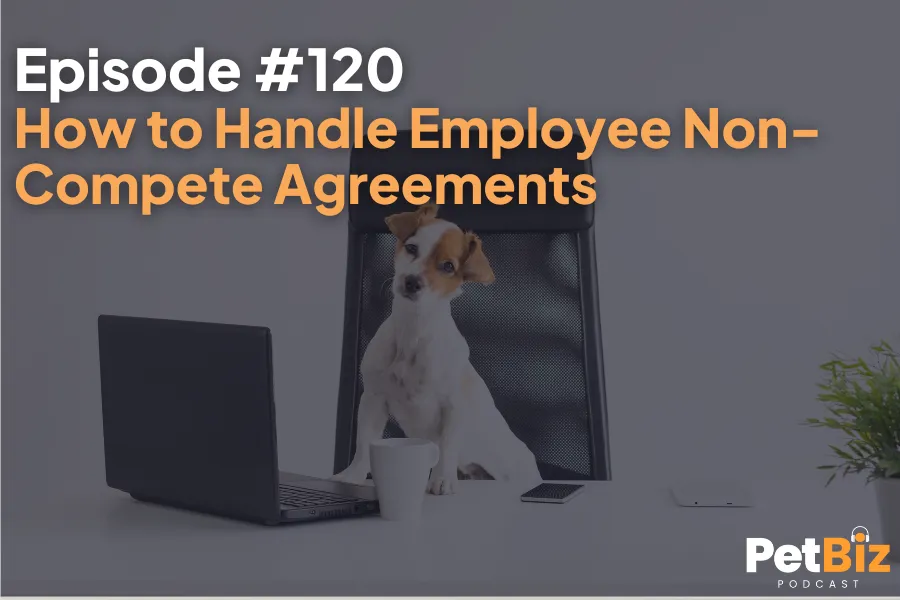
How to Handle Employee Non-Compete Agreements
Whenever you see a successful business, someone once made a courageous decision. -Peter F. Drucker
As a pet business owner, you pour your heart and soul into your work. You’ve built something special, and protecting it is likely always on your mind. One way to safeguard your business is with employee non-compete agreements. These agreements can be complex, so let’s explore how they work in the pet industry.
Understanding Employee Non-Compete Agreements
Non-compete agreements aim to protect your business interests, such as client relationships, specialized training methods, or your secret sauce for dog treats. These agreements are employment contracts that prevent former employees from competing with your business for a specific time.
What Goes into a Non-Compete?
Non-competes aren’t one-size-fits-all. Three key components typically define them: time, geography, and scope of work.
Time restricts how long a former employee can’t compete. Geography sets boundaries, say, a certain mile radius from your location. Scope outlines which activities are off-limits, preventing direct competition.
Typical non-compete periods are six months to one year, according to Investopedia.
State-Specific Rules and the FTC
These agreements are heavily state-dependent. Some states don’t allow them, while others impose limits, as covered by legal experts.
The Federal Trade Commission (FTC) proposed a rule change barring nearly all non-competes, citing unfair methods of competition. The FTC’s aim is fostering a more competitive American economy by allowing workers freer movement between jobs. This proposed rule, if finalized, would impact existing non-competes. It could be challenged in federal court, but its impact remains uncertain. Additional information on the FTC's non-compete clause rule can be found in their legal library, along with other legal resources.
The Pet Industry’s Nuances and Non-Competes
A crucial aspect of the pet business is the client bond. This bond requires special consideration with employee non-compete agreements.
Balancing Protection with Fairness
Consider the story of an in-home pet sitter. She built deep bonds with her clients, who requested only her every time. This made team scheduling tricky.
A flexible arrangement was worked out that didn't jeopardize the team approach. This scenario highlights how flexibility with non-competes protects businesses while keeping talented team members happy.
Types of Pet Businesses and Non-Competes
What about training businesses, mobile groomers, and other higher-skilled areas of the pet industry?
Non-competes are most relevant for jobs with specialized training or confidential processes. For example, if a trainer learns your proprietary method, a non-compete can protect your investments. It also balances that protection with the trainer’s ability to work after leaving your business. You may also consider this agreement for certain senior executives.
Navigating Legal and Ethical Concerns
Navigating non-competes is a balancing act between your needs and your employee's rights, avoiding unfairness. For further insight, review information provided by the National Employment Law Project regarding restrictive clauses.
Consulting with Legal Counsel is Key
Always seek expert legal help with non-compete agreements. A lawyer specializing in employment contracts can ensure yours complies with federal and state laws while being fair. They can also tailor agreements for amicable separations. This ensures the agreement considers any recent FTC announcements and federal register notices regarding these contracts.
Maintaining Open Communication with Employees
Discuss the non-compete agreement with your employee. Open communication fosters understanding and avoids surprises.
Alternatives to Non-Competes in the Pet Industry
Since non-competes are restricted in some states, consider alternatives, such as a non-solicitation or confidentiality agreement. This may better suit a small business trying to protect trade secrets.
Non-Solicitation Agreements
Instead of barring all competition, a non-solicitation agreement prevents former employees from contacting or working with past clients. This helps protect your business interests and your investment in those client relationships while providing fair opportunity for the departing employee. This would be particularly useful to enforce any part of the non-compete agreement regarding prior client relationships.
Confidentiality Agreements
Confidentiality agreements prevent former employees from disclosing company secrets and special processes. This is essential for protecting your business's unique methodologies, processes, or trade secrets. Such an agreement addresses public comment on unfair competition, as confidential information protection falls within accepted legal and ethical standards.
Conclusion
Employee non-compete agreements help protect your hard work and investment in your business. While tempting to handle this alone, non-competes present challenges. Consult a legal expert familiar with these agreements and current policy statements from regulatory bodies like the FTC. Ensure any agreement is beneficial for all parties, complying with all applicable rules. Be sure to fully understand the implications of these rules for senior executives.
